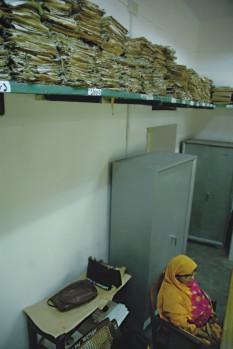
Inside
|
The Curse of Civil Service ZIAUDDIN CHOUDHURY decries the politicisation of our bureaucracy Bureaucracy is not an obstacle to democracy but an inevitable complement to it.
This was an informal meeting, and I was conversing with officials who had entered into civil service several decades after me. However, they were not young -- the junior-most among them told me he had already put in twenty years in government service. All of them had done a considerable amount of work in the field, and had years of experience working at the grass roots. Some of them were quite articulate, others less so but appeared to be knowledgeable when they responded to questions. What was striking however was their inability as a group to see themselves as possible leaders in implementing government programs. In their words that was the responsibility of political leaders or ministers. They viewed themselves as officials who followed instructions on specific tasks within given bounds of responsibility. Since my discussions with the civil service group from Bangladesh I have pondered if the downbeat response from the group was a result of lack of adequate preparation for the tasks they are entrusted with or if it was the environment in which they were working. I had been a civil servant, albeit some three decades ago. I had seen some qualitative deterioration in the civil service during that time (the 1970's), but mainly at the lower levels. However, I had not witnessed a lack of willingness or capability in our senior civil servants during that period to take on tasks of leadership to implement programs that the government had initiated. Many of them in fact had contributed to the design of many such programs, even the conception of some. Have things gone so wrong in the last thirty years that senior civil servants no longer feel connected to economic growth and development outcomes of the endeavours that they are supposed to implement? In a later discussion with one of the civil servants I would find some clue to this cautious approach to public programs and public policy, and their role in implementing these programs. In their view the zealous pursuit of government programs has often led to the identification of a civil servant with the political party in power with disastrous consequences to the career of that civil servant after a government changeover. They had cases in mind in the not too distant a past where civil servants who had pushed a government program or policy with passion were viewed by the successor government with suspicion and had been sidelined or even let off early. They were identified as belonging to the "other party." We have a civil service that is steeped in a system that is supposed to observe strict political neutrality in official conduct. Political governments may come and go, but the civil servants give continuity to the governance of the country. In countries that have a long-standing tradition of a permanent civil service, the civil servants are considered the government's backbone. They are assumed neutral because they have been recruited through competition based on merit rather than political connections. They have been looked upon as impartial upholders of law with no affiliation to the party in power or in opposition. Unfortunately, this image of the civil service is slipping away fast in our country. It is arguable however, how much of this undoing has been done by the civil servants themselves, and how much by the political pressure cooker under which they have been operating.
Impartiality and neutrality, two distinctive qualities demanded and expected of civil servants, begins to erode when there is a disconnect between reward and performance. In a merit-based system where recruitment is solely based on competition for the best, the expectation of future rewards for the civil servants is naturally a vertical progression in career. When job performances and career progression of civil servants are based on criteria separate from merit or other time-honoured traditions (such as experience and job qualifications), the civil servants also tend to bend and find ways of survival. The civil service operates within some norms and rules. When these are thrown aside, they compete with each other in finding innovative ways to benefit their career. For many it is going with the flow of the time. The history of our bureaucracy of the last forty years amply illustrates this phenomenon. Immediately following the breakup of Pakistan, the bureaucracy in Bangladesh comprised of two distinct groups. The civil servants who had formed the government in exile (referred to as Mujibnagari) and those who had remained in then East Pakistan. The number of the latter group was augmented later by the repatriates from Pakistan. The civil servants from the government in exile had an upper hand initially as they continued to hold on to some to key top jobs given to them by the political leadership in exile despite the fact there were people more qualified than them (years in job and experience). Then there were more senior jobs to be filled as the new post-liberation government was still being formed with civil servants who had stayed back. This is when the jockeying started, and all norms were abandoned. There was competition amongst senior bureaucrats to prove to the new leadership their loyalty to the newly emerged country. In this competition, much of which was unseemly, many civil servants deliberately chose to define loyalty to the country as fealty to the political leadership. Civil servants who had the benefit of having worked with or known the top leadership in their earlier career seemed to prosper better than others. Civil servants who did not have this benefit would woo their more fortunate colleagues to plead their cases to the political leadership for assignments or even retention in government service. One expected that with the change in the political leadership in mid 70s under rather tragic circumstances, and the ushering in of a non-political government (at least at the initial period), the incentive structure in the bureaucracy would return to normal. None of that happened. The competition would now begin in foreswearing any loyalty to the previous leadership, and vowing allegiance to the new regime. Senior bureaucrats of earlier times were sidelined in favour of the ones who were ditched before. Officials sacked before on suspicions of disloyalty to the state (read political party) were reinstated in their jobs, many dislodging the ones favoured before. The loyalty this time was judged not directly by a renewed pledge of allegiance to the new government or the new strong man, but indirectly by proof of disassociation with the previous government. They were assumed loyal to the new regime because they had been dismissed or by- passed in promotion by the previous government. Civil servants retired prematurely by the earlier government were rehired, and many of those who were catapulted above were pushed aside or sent to oblivion. The seminal events of the seventies would form a watershed of relations between the civil service and politicians for the upcoming period. The stance of our politicians that the civil servants belong to one political camp or other would shape both civil service conduct and the attitude of the politicians to the civil servants for next decades. At each national election the party in opposition feared that the elections would be manipulated by officials suspected of "loyalty" to the party in power. I myself had heard top political leaders air their fears of manipulation by civil servants even when the elections were conducted by a politically neutral caretaker government. It was because they believed that the civil servants were no longer neutral. They were presumed to have been promoted to senior or otherwise important positions because of their "bend" towards the party in power. Hence, once elected to power the newly elected party attempted to cleanse the government of such "disloyal" elements. The cycle would repeat with every change. The emergence of this political ethos would permanently change performance incentives for the majority of civil servants. They would avoid decision making in matters pertaining to policy or take leadership in nation building efforts. They would push upward the responsibility for making decisions. They would avoid any attempt at reforming obsolete practices. Obviously all of this was done to avoid close identification with the government in power, and later retaliation by a successive government. These self-serving actions will eventually have a cumulative effect on the governance of the country in general and the morale of the civil service in particular. No wonder the clutch of civil servants that I ran into appeared dubious about their role in putting into action what they had learnt in their leadership training program. It is time that our government took steps to stem this downward slide. No government program can succeed, however strong the political leadership is, without an efficient and productive civil service. The only way that this can happen is by the return of the civil service to true professionalism that is expected of the service. I am not aware of any current civil service reform activity being undertaken in Bangladesh. But one important aspect of any reform should address the current deficit in mutual trust between the civil service and political leadership. Among developing countries Bangladesh is among the few that inherited a civil service system that relied on an impartial, competition based, patronage-free recruitment system. It is a pity that we allowed this system to degenerate into a feckless bureaucracy that is proving to be unable to handle the onerous tasks of economic development. No amount of training in leadership development can instill in our civil servants the zeal and enthusiasms to run with a program and implement it without fear or favour unless the basic conditions where they work are set right. The main principles governing a professional civil service are that it should be merit and competition based, and its members should be protected for their political neutrality. Fortunately, we do not have to reinvent these wheels; we already had them as our guiding principles. What we need is a strict following of these principles in administering our civil service. If we want our civil servants to be efficient, politically neutral, and productive we should create the proper incentive structure for it away from the deleterious environment that it has been sucked into. The incentives should be simple and straight- forward. Keep entrance to the service and career progression entirely merit-based and free from political considerations. Ensure protection of civil servants for their political neutrality, and from arbitrary removal. Make transparent all decisions on rewards and punishment. And foremost, make it mandatory that dabbling in politics by civil servants, and currying favour from politicians would be viewed with utmost severity and consequences. Ziauddin Choudhury is a former civil servant in Bangladesh, who now works for the World Bank in Washington DC. |
 A few months ago I had an opportunity to meet and sit with some visiting senior civil service officials of our country. These officials were taking part in a World Bank Institute sponsored training program in leadership development. The specific program is related to building of leadership that could facilitate and manage the process of design and implementation of economic development and poverty eradication programs.
A few months ago I had an opportunity to meet and sit with some visiting senior civil service officials of our country. These officials were taking part in a World Bank Institute sponsored training program in leadership development. The specific program is related to building of leadership that could facilitate and manage the process of design and implementation of economic development and poverty eradication programs. 